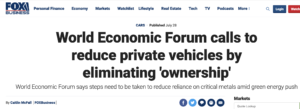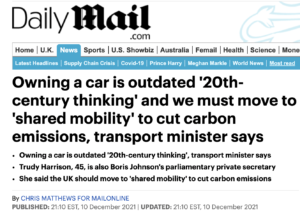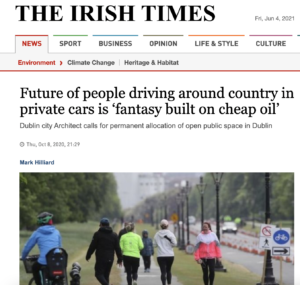By Caitlin McFall FOXBusiness
The World Economic Forum is looking to reduce global reliance on critical metals as nations look to make the transition to renewable energy supplies, and one proposal is reducing ownership of private vehicles.
“This transition from fossil fuels to renewables will need large supplies of critical metals such as cobalt, lithium, nickel, to name a few,” the forum said in a report earlier this month. “Shortages of these critical minerals could raise the costs of clean energy technologies.”
The international lobbying organization based in Switzerland has proposed three solutions for lowering the costs of critical metals used in everything from cellphones and electric vehicles to wind turbines and efficient lighting.
The forum noted that even with recycling initiatives in place mineral mining is expected to increase by 500% by 2050.
“More sharing can reduce ownership of idle equipment and thus material usage,” the group argued, pointing to statistics that show the average vehicle in England is driven “just 4% of the time.”
Vehicle sharing initiatives like “Getaround” and “BlueSG” have become increasingly popular around the world and are key in reducing the number of cars and electronics needed globally, the forum argued.
Though it did not address how car sharing could be more effectively utilized in a nation like the U.S. where cars are heavily relied on and public transportation is lacking in both rural and urban communities.
The report also pointed out that most people around the world already have personal phones or computers but 39% of global workers are also provided laptops and mobile phones.
“This is not at all resource efficient,” the report said. “Keeping a smartphone for five years instead of three reduces the phone’s annual carbon footprint by 31%.”
The report said companies need to be incentivized to reward consumer longevity and encourage product repurposing to prevent new mines from being opened.
FOX Business: WEF calls to reduce private vehicles by eliminating “ownership”
— The Post Millennial (@TPostMillennial) July 29, 2022
#
The WEF Wants to Reduce Car Ownership by 90% & Nudge People Into Eating Plants & Bugs
The WEF has been advocating for a massive reduction of motor vehicles for years. In December of 2016, the forum set as a goal for “the future of transport,” a 90 percent decrease of vehicles on the road.
“More than a million people are killed in motor vehicle accidents each year, and many more are threatened by transportation’s contribution to global warming,” the forum said.
Imagine instead a world where fleets of autonomous vehicles that are electric and shared (FAVES) slash the number of vehicles on the road by as much as 90%. Hailing and paying for a ride or delivery is as easy as tapping a smart phone app. Car loans and insurance payments shrink or disappear because renting a vehicle when it would otherwise sit idle (or feeding electricity back to the electric grid) more than pays for it.
Perhaps best of all, imagine wider, less congested streets with more room for pedestrians and bicycles, clean air, much less global warming, shorter commutes, and even “crowd-funded” fleets of vehicles whose routing and pricing software is tuned to minimize energy use or provide low-cost transportation to underserved regions.
The WEF also advocates that people stop consuming meat and instead eat insects, algae, lentils, fonio, okra, moringa, spinach, mushrooms, and cactuses to lower their “carbon footprints.”
This incredible computer is powered by algae.
Learn more about the power of the plant: https://t.co/NkwvAXCpOR pic.twitter.com/aPWaDpVOHL
— World Economic Forum (@wef) May 30, 2022
Let Them Eat BUGS:
In the Great Starvation Reset: "You'll eat insects and be happy"
UN/WEF actor @tanya_plibersek's device to achieve this is the Juukan Hoax, and made-up aboriginal woke mythology delivered as science pic.twitter.com/IwiYad93MU
— Josephine Cashman (@Josieamycashman) July 23, 2022
“Most of us know that vegetarian options are better for our health and the planet, and now scientists are studying how to convince us to make more sustainable choices,” WEF senior writer Simon Torkington wrote in an article in March about how to convince people to eat less meat.
Torkington cited a study by the World Resources Institute (WRI) which found that “displaying thoughtfully framed environmental messages on restaurant menus can significantly increase customers’ uptake of lower carbon, plant-rich dishes.”
Researchers asked 6,000 meat-eaters to choose options from an online menu, using former Obama official Cass Suntein’s infamous “nudge theory” to encourage one group to consider non-meat menu selections.
Participants in the control group got a normal menu, while others were offered prompts that asked them to consider eating less meat. These subtle interventions are derived from a branch of behavioural science known as “nudge theory.” At its core is the idea that positive reinforcement influences decision making.
One method “nudge theory” adherents apparently use to persuade people is to lie to them about what their peers think.
“90 percent of Americans are making the change to eat less meat. Join this growing movement and choose plant-based dishes that have less impact on the climate and are kinder to the planet,” one of the “nudges” said.
The results from the study reportedly showed “a dramatic rise in the selection of non-meat options by those who were nudged to make healthier and more sustainable choices.”
It remains to be seen whether most Americans can be talked into adding beetles and grasshoppers to their diets to save the planet.
#
Calls for ending private car ownership are growing:
Irish Times: Future of people driving around country in private cars is ‘fantasy built on cheap oil’
‘Climate Emergency’: Ireland Set to Ban Private Cars
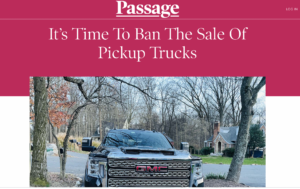
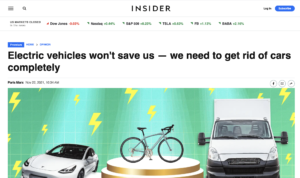
Climate Lockdowns: British Medical Journal Study Calls For ‘Substantially fewer journeys by car
Flashback: Dem presidential candidate Andrew Yang: Climate Change May Require Elimination of Car Ownership – Suggests ‘constant roving fleet of electric cars’– “We might not own our own cars.”
World Economic Forum calls to reduce private vehicles by eliminating ‘ownership’ | Climate Depot https://t.co/cTHvwmfL2F pic.twitter.com/uUhqMSfdWf
— Marc Morano (@ClimateDepot) August 1, 2022

